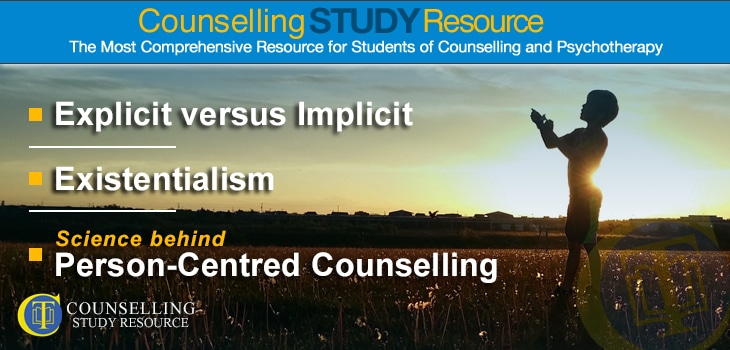057 – Explicit versus Implicit – Existentialism – Science behind Person-Centred Counselling
In episode 57 of the Counselling Tutor Podcast, Ken and Rory talk about the difference between ‘explicit’ and ‘implicit’. ‘Theory with Rory’ discusses existentialism. Last, the presenters explain the science behind person-centred counselling.
Explicit versus Implicit (starts at 1.21 mins)
The awarding body CPCAB asks students to differentiate between ‘implicit’ and ‘explicit’ in the world of counselling.
Rory explains that these terms relate to the difference between using counselling skills (e.g. for support workers, nurses, police officers and hairdressers, who may do level 2/3 training in counselling skills to facilitate their main work) and actual counselling. Using counselling skills involves using active listening to support other work, but not looking to go deeper or to dig into any emotions (which would be unethical given the context and likely time constraints).
While using counselling skills focuses on the content brought by clients or service users, actual counselling looks at their process – ‘the music behind the words’. For example, a counsellor might comment on mismatches between the client’s words and body language, so identifying possible incongruence.
Existentialism (starts at 8.46)
Philosophers from long ago – such as Plato and Socrates – believed that essence precedes existence: in other words, they thought that humans were put in the world with a specific purpose. As time went on, religion took on this role of seeking to explain the purpose of life. However, following the Second World War, intellectual thinking shifted as a result of the horrors of the concentration camps and Holocaust.
In particular, Jean-Paul Sartre turned the original argument on its head, asserting that existence preceded essence: we arrive in the world with no set purpose and must make our own. Humans are thus free – and we are responsible for ourselves. Existentialists believe that it is this need to find our own meaning that causes anxiety.
Counsellors and psychotherapists work with clients’ attempts to find meaning in their experiences, for example in loss and in other difficult times. Carl Rogers, in his work developing person-centred counselling, was influenced by theist existentialist Søren Kierkegaard and his teleological ideas. Existentialism has also informed transactional analysis, in the form of existential life positions.
Free Handout Download
5 Ideas in Existential Counselling
Science behind Person-Centred Counselling (starts at 16.10 mins)
What is the science behind person-centred counselling? How can the use of counselling skills and the six necessary and sufficient conditions help people?
Ken and Rory explain the basics of person-centred theory, developed by Carl Rogers following many ‘interviews’ (as he called them) between his students and clients. While there is a substantial body of person-centred theory, it is more metaphysical than some other branches of psychotherapy (e.g. cognitive-behavioural and psychodynamic modalities). It is not an exact science, and is more about being than about doing.
Trusting the process is key. This can be difficult in the early stages of your placement as a student counsellor, but doing so really can bring amazing results, as Ken and Rory recount from their own experience.
Links and Resources
Counselling Tutor Handouts Vault
